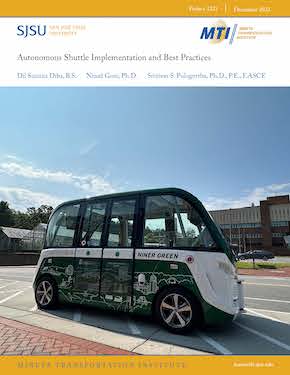- 408-924-7560
- mineta-institute@sjsu.edu
- Donate
Autonomous Shuttle Implementation and Best Practices
When, where, and how autonomous shuttles are deployed can have significant safety, economic, and policy impacts on their operation and performance. This research analyzes data related to 120 existing deployments of autonomous shuttles, looking at safety, operational, economic, and policy-related issues. Analysis shows that autonomous shuttles would be an excellent supplement to public transportation. However, improvements to the vehicle and the infrastructure are needed before any permanent deployment. The study also analyzes the perceptions of practitioners, industry experts, and transportation system users toward autonomous shuttles. Principal Component Analysis (PCA) and Multiple Input Multiple Cause Structural Equation Modelling (SEM) approaches were adopted to analyze the perception data. The results from the PCA highlighted critical barriers to autonomous shuttle implementation, including underutilization measures, safety concerns, seating arrangements, reliability, data security, operational aspects, sensor technology, and lane use. The results from the SEM revealed that users’ willingness to use autonomous shuttles is influenced by their perceived safety, comfort, trust in autonomous shuttles, familiarity with autonomous shuttles, household income, age, and frequency of transit usage. A set of recommended best practices for deploying autonomous shuttles is proposed based on the insights from multiple case studies and the perceptions of practitioners and industry experts.
DIL SAMINA DIBA, BS
Ms. Diba is pursuing her Ph.D. in Civil Engineering at the University of North Carolina at Charlotte. Her areas of interest are autonomous shuttles, traffic safety, and traffic operation.
NINAD GORE, PHD
Dr. Gore is currently working as a postdoctoral researcher of the Department of Civil and Environmental Engineering at the University of North Carolina at Charlotte. His research interests include traffic conflict-based safety evaluation, traffic flow theory and modeling, travel behavior, and the application of econometric and machine learning models to transportation.
SRINIVAS S. PULUGURTHA, PHD, PE, FASCE
Dr. Pulugurtha is currently working as a professor and research Director of the Department of Civil and Environmental Engineering at the University of North Carolina at Charlotte.
-
Contact Us
San José State University One Washington Square, San Jose, CA 95192 Phone: 408-924-7560 Email: mineta-institute@sjsu.edu






